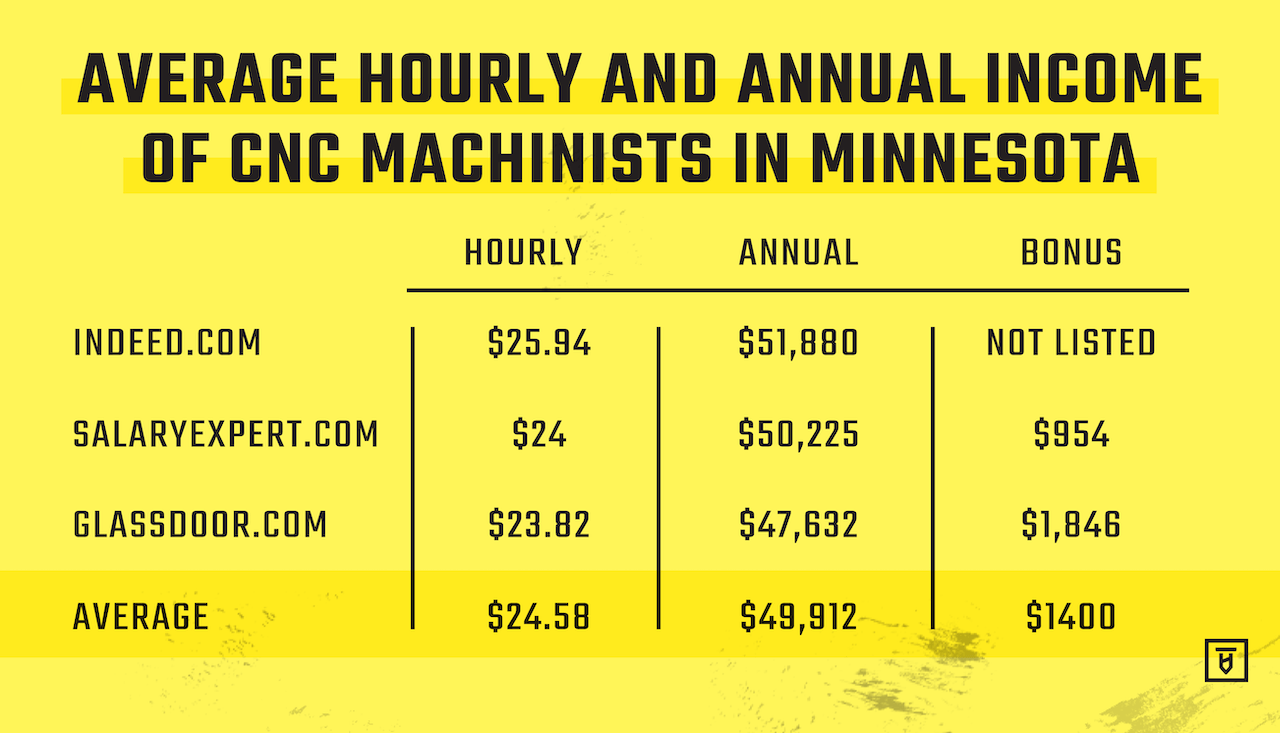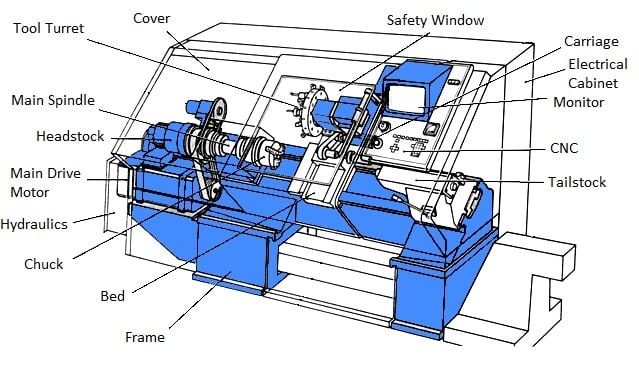Table of Contents
- How Much Salary for CNC Lathe Operator?
- Frequently Asked Questions
- What is the average salary for a CNC Lathe Operator?
- What factors affect the salary of a CNC Lathe Operator?
- What are the job prospects for CNC Lathe Operators?
- What are the education and training requirements for a CNC Lathe Operator?
- What are the skills required to become a successful CNC Lathe Operator?
Do you have a passion for working with machinery and are interested in becoming a CNC lathe operator? One question that may come to mind is how much salary you can expect to earn in this profession. The answer is not cut and dry, as there are several factors that can influence your pay as a CNC lathe operator. In this article, we will explore the various variables that can impact your salary and provide you with an estimate of how much you can earn in this field.
How much salary can a CNC Lathe Operator expect?
The salary of a CNC Lathe Operator varies depending on the company and location. Generally, the average salary of a CNC Lathe Operator in the United States is around $17-$26 per hour. However, experienced operators can earn up to $30 per hour or more. Some companies also offer benefits such as health insurance, retirement plans, and paid time off.
How Much Salary for CNC Lathe Operator?
CNC (Computer Numerical Control) lathe operators are in high demand in various industries. They work with precision machinery to produce parts and components for various products. The salary of a CNC lathe operator depends on several factors, including experience, education, and the industry they work in. This article explores the salary range for CNC lathe operators and what factors affect their pay.
Experience and Education
CNC lathe operators with more experience and education tend to earn higher salaries. Entry-level operators with no experience may earn $12-$15 per hour. However, with a few years of experience, their salary can increase to $20-$25 per hour. Experienced operators who have been in the field for over a decade can earn upwards of $30 per hour.
Experience and education also affect job opportunities and advancement. CNC lathe operators with more experience and education are more likely to be promoted to supervisory or management positions.
Industry
The industry in which a CNC lathe operator works also affects their salary. For example, according to the Bureau of Labor Statistics, the average hourly wage for CNC lathe operators in the aerospace product and parts manufacturing industry is $26.99, while the average hourly wage for those in the motor vehicle parts manufacturing industry is $18.61.
The demand for CNC lathe operators also varies by industry. Some high-demand industries include aerospace, automotive, and medical equipment manufacturing. These industries typically offer higher salaries and better benefits packages to attract and retain skilled operators.
Geographic Location
The geographic location of a CNC lathe operator also affects their salary. Operators in urban areas tend to earn more than those in rural areas. The cost of living and competition for skilled labor also affect salaries by region.
For example, according to the Bureau of Labor Statistics, the average hourly wage for CNC lathe operators in California is $22.95, while the average hourly wage for those in Alabama is $16.99. However, it’s essential to consider the cost of living in each state when comparing salaries.
Benefits
The benefits package offered to CNC lathe operators can also affect their overall compensation. Benefits may include health insurance, dental insurance, retirement plans, paid time off, and bonuses.
Operators working in high-demand industries or for larger companies may have access to better benefits packages. These benefits can add significant value to an operator’s total compensation.
Advancement Opportunities
CNC lathe operators who are interested in advancing their careers should consider pursuing additional education or training. Additional education or training can lead to higher-paying positions, such as a CNC programmer or manufacturing engineer.
Many employers offer tuition reimbursement or on-the-job training programs to help employees advance their skills and careers.
Union Membership
Some CNC lathe operators are members of a union, which can affect their salary and benefits. Union members typically have more negotiating power when it comes to wages and benefits. They may also have access to additional benefits, such as job security and pension plans.
However, not all employers are unionized, and not all CNC lathe operators are members of a union. Union membership is a personal choice and should be researched carefully before making a decision.
CNC Lathe Operator vs. Other Manufacturing Jobs
CNC lathe operators are just one type of manufacturing job. Other manufacturing jobs, such as welders, machinists, and tool and die makers, also require specialized skills and experience.
The average hourly wage for welders, according to the Bureau of Labor Statistics, is $20.43. The average hourly wage for machinists is $21.33, and the average hourly wage for tool and die makers is $27.84.
CNC lathe operators may earn more or less than these other manufacturing jobs, depending on their experience, education, and industry.
The Bottom Line
CNC lathe operators are in high demand in various industries. Their salary depends on several factors, including experience, education, industry, geographic location, benefits, and advancement opportunities. CNC lathe operators can earn a decent living wage and have opportunities for advancement in their careers.
Frequently Asked Questions
In this section, you will find answers to frequently asked questions about the salary of CNC Lathe Operators.
What is the average salary for a CNC Lathe Operator?
The average salary for a CNC Lathe Operator is around $18 per hour in the United States. However, the salary can range from $12 to $27 per hour depending on the experience level, location, and industry. CNC Lathe Operators with more experience and expertise in their field can earn higher salaries compared to those who are just starting out.
Moreover, the industries that offer the highest salaries for CNC Lathe Operators are aerospace and defense, automotive, and medical manufacturing. These industries require precision and high-quality machining, which makes the skills of CNC Lathe Operators more valuable.
What factors affect the salary of a CNC Lathe Operator?
The salary of a CNC Lathe Operator can be affected by several factors, including experience, education, location, and industry. CNC Lathe Operators with more experience and expertise in their field can earn higher salaries compared to those who are just starting out. Additionally, those with formal education or certification in machining can also earn higher salaries.
Location is also a significant factor in determining the salary of CNC Lathe Operators. The cost of living and demand for skilled labor in a particular area can affect the salary. Lastly, the industry in which a CNC Lathe Operator works can also impact their salary. Industries that require precision and high-quality machining typically offer higher salaries.
What are the job prospects for CNC Lathe Operators?
The job prospects for CNC Lathe Operators are generally good, with a projected growth rate of 3% from 2019 to 2029. The demand for skilled machinists, including CNC Lathe Operators, is expected to increase as manufacturing and production industries continue to grow.
However, the job prospects for CNC Lathe Operators can be affected by the automation of manufacturing processes. As companies continue to automate their operations, the demand for manual machinists may decrease. Therefore, CNC Lathe Operators who have experience with computer programming and automation may have better job prospects.
What are the education and training requirements for a CNC Lathe Operator?
Typically, a high school diploma or equivalent is required to become a CNC Lathe Operator. However, some employers may prefer candidates with formal education or certification in machining. These programs can range from 6 months to 2 years and cover topics such as blueprint reading, computer programming, and precision measurement.
On-the-job training is also common for CNC Lathe Operators. This training can last several months and involves learning how to operate and maintain CNC Lathe machines, as well as how to read and interpret blueprints and specifications.
What are the skills required to become a successful CNC Lathe Operator?
Successful CNC Lathe Operators require a combination of technical and soft skills. Technical skills include knowledge of computer programming, blueprint reading, and precision measurement. Moreover, CNC Lathe Operators should have a thorough understanding of the machining process and how to troubleshoot issues that may arise during the operation of the machines.
Soft skills are also essential for CNC Lathe Operators. These include communication, problem-solving, and attention to detail. CNC Lathe Operators should be able to communicate effectively with their team members and supervisors, as well as interpret technical specifications and blueprints accurately. Additionally, attention to detail is crucial for CNC Lathe Operators to ensure that the parts they produce meet the required specifications and quality standards.
In conclusion, the salary for a CNC lathe operator can vary depending on several factors including experience, location, and industry. While some entry-level positions may offer a lower salary, there is room for growth and advancement within this field. With additional training and experience, CNC lathe operators can earn a higher salary and take on more complex projects.
It is important to note that the demand for skilled CNC lathe operators is high, particularly in industries such as manufacturing and aerospace. This means that there may be opportunities for competitive salaries and benefits packages, including health insurance and retirement plans.
Overall, becoming a CNC lathe operator can be a rewarding career choice for those interested in working with machinery and technology. With the potential for growth and a high demand for skilled workers, this field offers opportunities for both personal and financial success.
Request a quote today!
[contact-form-7 id="1578" title="Contact form"]
Please compress the file into a ZIP or RAR file before uploading. Alternatively, send through your RFQ by email.
enquires@unitymanufacture.com





